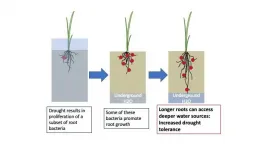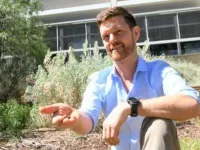Archaeology: Roman road discovered in the Venice lagoon
2021-07-22
(Press-News.org) The discovery of a Roman road submerged in the Venice Lagoon is reported in Scientific Reports this week. The findings suggest that extensive settlements may have been present in the Venice Lagoon centuries before the founding of Venice began in the fifth century.
During the Roman era, large areas of the Venice Lagoon which are now submerged were accessible by land. Roman artefacts have been found in lagoon islands and waterways, but the extent of human occupation of the lagoon during Roman times has been unclear.
Mapping the lagoon floor using sonar, Fantina Madricardo and colleagues discovered 12 archaeological structures aligned in a northeasterly direction for 1,140 metres, in an area of the lagoon known as the Treporti Channel. The structures were up to 2.7 metres tall and 52.7 metres long. Previous surveys of the Treporti Channel uncovered stones similar to paving stones used by Romans during road construction, indicating that the structures may be aligned along a Roman road. The researchers also discovered an additional four structures in the Treporti Channel that were up to four metres tall and 134.8 metres long. Based on its dimensions and similarity to structures discovered in other areas, the largest of these structures is thought to be a potential harbour structure, such as a dock. Previously collected geological and modelling data indicates that the road is located on a sandy ridge that was above sea level during the Roman era but is now submerged in the lagoon.
The findings suggest that a permanent settlement may have been present in the Treporti Channel during the Roman era. The authors propose that the road may have been linked to a wider network of Roman roads in the Italian Veneto Region and may have been used by travellers and sailors to journey between what is now the city of Chioggia and the Northern Venice Lagoon.
INFORMATION:
Article details
New evidence of a Roman road in the Venice Lagoon (Italy) based on high resolution seafloor reconstruction
DOI: 10.1038/s41598-021-92939-w
Corresponding Author:
Fantina Madricardo
ISMAR-Marine Science Institute in Venice, Venice, Italy
Email: fantina.madricardo@ismar.cnr.it
Please link to the article in online versions of your report (the URL will go live after the embargo ends):
https://www.nature.com/articles/s41598-021-92939-w
ELSE PRESS RELEASES FROM THIS DATE:
2021-07-22
Newly-hatched pterosaurs may have been able to fly but their flying abilities may have been different from adult pterosaurs, according to a study published in Scientific Reports.
Pterosaurs were a group of flying reptiles that lived during the Triassic, Jurassic and Cretaceous Periods (228 to 66 million years ago). Due to the rarity of fossilised pterosaur eggs and embryos, and difficulties distinguishing between hatchlings and small adults, it has been unclear whether newly-hatched pterosaurs were able to fly.
Darren Naish and colleagues modelled hatchling flying abilities using previously obtained wing measurements from four established hatchling and embryo fossils from two pterosaur species, ...
2021-07-22
Gene therapy in mouse models showed promise in preventing vision loss or blindness from serious retinal injury including optic nerve damage, and from retinal disease including diabetic retinopathy and glaucoma, Mount Sinai researchers report. Their study, published in the July 22 online publication of Cell, could transform treatment for those at risk of major vision loss from retinal degenerative diseases, which currently have no cure.
The researchers focused on retinal ganglion cells, which process visual information by sending images to the brain. These cells can degenerate as a result of retinal injury and retinal disease. ...
2021-07-22
Geneticists from Trinity College Dublin have discovered how a specific genetic mutation called H3K27M causes a devastating, incurable childhood cancer, known as diffuse midline glioma (DMG), and - in lab studies working with model cell types - successfully reverse its effects to slow cancer cell growth with a targeted drug.
Their landmark work - just published in leading international journal, Nature Genetics and supported by Worldwide Cancer Research and The Brain Tumour Charity - translates crucial new understanding of the genetics of DMG progression into ...
2021-07-22
A form of gene therapy protects optic nerve cells and preserves vision in mouse models of glaucoma, according to research supported by NIH's National Eye Institute. The findings suggest a way forward for developing neuroprotective therapies for glaucoma, a leading cause of visual impairment and blindness. The report was published in Cell.
Glaucoma results from irreversible neurodegeneration of the optic nerve, the bundle of axons from retinal ganglion cells that transmits signals from the eye to the brain to produce vision. Available therapies slow vision loss by lowering elevated eye pressure, however some glaucoma progresses to blindness despite normal eye pressure. Neuroprotective therapies would be a leap forward, meeting ...
2021-07-22
Advances in microscopy have enabled researchers to picture loops of DNA strands for the first time. The images reveal how the human genome organises itself in three-dimensional space at much higher resolution than previously possible.
The findings, published in a new study in the journal Molecular Cell, also reveal that the process of DNA being copied into RNA - transcription - indirectly shapes the architecture of the genome. An international team led by Pia Cosma at the Centre for Genomic Regulation (CRG) in Barcelona and Melike Lakadamyali at the Perelman ...
2021-07-22
Manipulating RNA can allow plants to yield dramatically more crops, as well as increasing drought tolerance, announced a group of scientists from the University of Chicago, Peking University and Guizhou University.
In initial tests, adding a gene encoding for a protein called FTO to both rice and potato plants increased their yield by 50% in field tests. The plants grew significantly larger, produced longer root systems and were better able to tolerate drought stress. Analysis also showed that the plants had increased their rate of photosynthesis.
"The change really is dramatic," said University of Chicago Prof. Chuan He, who together with Prof. Guifang Jia at Peking University, led ...
2021-07-22
A new study showed that a wearable computer vision device can reduce collisions for both people who are blind or those who are visually impaired and using a long cane and/or guide dog by 37 percent, compared to using other mobility aids alone.
People who have visual impairments are at a significantly higher risk for collisions and falls. Commonly used mobility aids like long canes and guide dogs can offer benefits, but come with limitations in effectiveness and costs, respectively. While some electronic devices are marketed direct-to-consumer claiming to warn wearers of surrounding objects, there has been little evidence of their effectiveness in actual daily mobility settings. This is one of the first randomized-controlled trials to look at the potential benefit of the ...
2021-07-22
What The Study Did: This study included 647 patients with untreated nonmetastatic prostate cancer (269 patients during the pandemic and 378 from before the pandemic). During the initial COVID-19 lockdown, only 1% of Black men underwent prostatectomy, while 26% of white patients did. Prior to the pandemic, there was no difference in the rate of prostatectomy between the two races (18% of Black men and 19% of white men). The lessons from this study suggest systemic inequities within health care and are likely applicable across medical specialties. Public health efforts are needed to fully recognize the unintended consequence of diversion of cancer resources to the COVID-19 pandemic to develop balanced mitigation strategies as viral rates continue to fluctuate.
Authors: ...
2021-07-22
Drought can have a lasting impact on the community of microbes that live in and around roots of rice plants, a team led by UC Davis researchers has found. Root-associated microbes help plants take up nutrients from the soil, so the finding could help in understanding how rice responds to dry spells and how it can be made more resilient to drought. The work is published July 22 in Nature Plants.
The root microbiome of irrigated rice plants goes through a sequence of changes as the plants grow and stabilizes when they flower. The sequence of changes in the root ...
2021-07-22
Restoration of degraded drylands is urgently needed to mitigate climate change, reverse desertification and secure livelihoods for the two billion people who live there, experts warn in a major new paper in Nature Ecology & Evolution.
Scientists leading the Global Arid Zone Project examined restoration seeding outcomes at 174 sites on six continents, encompassing 594,065 observations of 671 plant species - with the lessons learned important to meeting ambitious future restoration targets.
Flinders University Dr Martin Breed, one of three Australian researchers who helped coordinate ...
LAST 30 PRESS RELEASES:
[Press-News.org] Archaeology: Roman road discovered in the Venice lagoon



